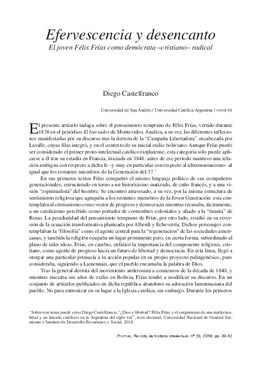Efervescencia y desencanto : el joven Félix Frías como demócrata –cristiano– radical
Fervor and disillusionment. The young Félix Frías as a –Christian– radical democrat

Ver/
Fecha
2019Autor
Castelfranco, DiegoResumen
El presente artículo analiza los escritos y la trayectoria pública temprana de Félix Frías a fines de la década de 1830 y comienzos de la de 1840. Se argumenta que, si bien compartió el mismo lenguaje político de sus compañeros de generación, se diferenció de otros personajes como Alberdi y Echeverría en dos aspectos: enfatizó la preeminencia de la religión –cristiana– sobre la filosofía para transformar la realidad rioplatense y eludió, en un primer momento, la apelación a un sistema tutelar por el cual una élite intelectual debía “educar” al pueblo para que este pudiera ejercer sus derechos políticos. Al exiliarse en Bolivia, por otro lado, conservó su lenguaje político pero comenzó a manifestar un giro ideológico: tras defender una suerte de ideal democrático radical, influido por Lamennais, comenzó a considerar que un Estado fuerte debía garantizar el orden para que las élites intelectuales pudieran “civilizar” a la población y conducirla hacia la democracia. This article analyzes the writings and early public trajectory of Félix Frías at the end of the 1830s and the beginning of the 1840s. Although he shared the same political language of his generational colleagues, he differed from other individuals such as Alberdi and Echeverría in two respects: he emphasized the pre-eminence of –christian– religion over philosophy and eluded, at first, the appeal to a tutelage system in which an intellectual elite considered that it needed to “educate” the people before they could exercise their political rights. While exiled in Bolivia, on the other hand, he conserved his political language but began to manifest an ideological turn: after having defended a kind of radical democratic ideal, influenced by Lamennais, he instead came to consider that a strong state should guarantee the social order so that an intellectual elite could “civilize” the population and lead it towards democracy.
